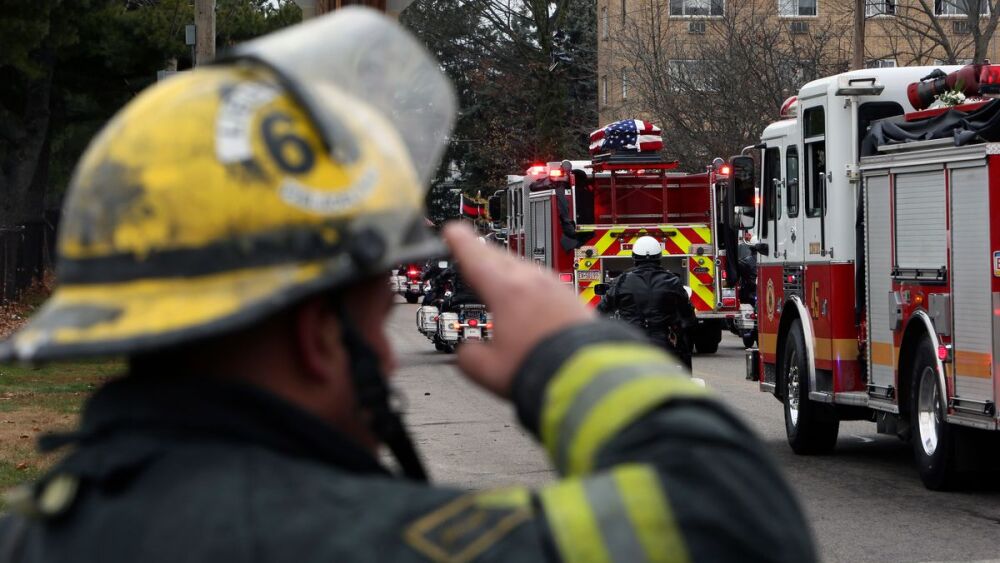The Public Safety Officers’ Benefits (PSOB) program was established in 1976 to offer peace of mind to those considering a career in public safety that they and their loved ones would be taken care of in the event of a career-ending injury or death.
The mission of the PSOB is to “assist public safety officers, their agencies, and their families before, during, and after a tragedy occurs” by:
- Responding rapidly to PSOB benefit claims;
- Offering humane support of public safety officers, their agencies and their families; and
- Seeking opportunities to expand assistance to the public safety field.
What is the Public Safety Officers’ Benefits program?
The PSOB program provides death and education benefits to survivors of fallen law enforcement officers, firefighters and other first responders, as well as disability benefits to officers catastrophically injured in the line of duty.
Who is eligible for the PSOB program?
Those eligible to apply for program benefits include:
- Disabled public safety officers;
- Surviving spouses and parents of fallen public safety officers; and
- Children of fallen public safety officers.
Are providers employed at private EMS organizations eligible for PSOB benefits?
Paramedics and EMTs employed by private ambulance services or rescue squads are eligible for benefits as outlined in the Dale Long Public Safety Officers’ Benefits Improvement Act of 2012; however, this coverage does not extend to individuals employed by for-profit agencies.
What type of benefits are available through the PSOB?
The PSOB program offers three types of benefits: death benefits, disability benefits and education benefits.
- Death benefits: The PSOB provides a one-time benefit to eligible survivors of public safety officers whose deaths were the direct result of an injury sustained in the line of duty on or after Sept. 29, 1976.
- Disability benefits: The PSOB provides a one-time benefit to eligible public safety officers who were permanently and totally disabled as a result of a catastrophic injury sustained in the line of duty on or after Nov. 29, 1990.
- Education benefits: The PSOB provides support for higher education to eligible spouses and children of public safety officers who died in the line of duty or where catastrophically disabled in the line of duty. This benefit pays for 45 months of full-time education or training, or for a proportional period of time for a part-time program.
For the 2022 fiscal year, the one-time benefit amount for PSOB death and disability benefits is $389,825. The PSOB educational assistance benefit for one month of full-time attendance is $1,298.
See the below chart for the PSOB death benefit disbursement hierarchy:
Are PSOB benefits taxable?
No, payments received through the PSOB program are not taxed. In 2015, President Obama signed into law the Don’t Tax Our Fallen Public Safety Heroes Act after it passed both houses of Congress unanimously.
Are COVID line-of-duty deaths eligible for benefits under the psob?
Yes, survivors of public safety officers who died after contracting COVID-19 in the line of duty are eligible for the PSOB program. The Protecting America’s First Responders Act of 2021 provides a presumption of PSOB eligibility for line-of-duty deaths and disability due to COVID-19 if the following conditions are met:
- No competent medical evidence exists that the officer’s death was directly and proximately caused by something other than COVID-19;
- The officer engaged in a line of duty action or activity between Jan. 1, 2020, and Dec. 31, 2023, or the date on which the public health emergency for COVID-19 declared by the Secretar of Health and Human Services expires;
- The officer was diagnosed with COVID-19, or evidence indicates that the officer had COVID-19, during the 45-day period beginning with the last day of the officer’s duty; and
- Evidence indicates that the officer had COVID-19 or complications from COVID-19 at the time of his or her death.
According to a March 2020 statement from the Department of Justice, the PSOB Office will “work closely with survivors, officers, and agencies to seek evidence of the exposure and causation through all available evidence.”
How do I apply for the PSOB program?
For death and disability benefits, there are two parts to the application process: Part A of the application is completed by the applicant or authorized representative, and Part B is completed by the public safety agency.
For education benefits, applicants should submit an initial prescreen application, which confirms program eligibility. Once approved, an initial payment application is submitted along with additional documents and information.
To view a sample benefits application or to submit a claim, visit the PSOB website.
Can I appeal if my PSOB application was rejected?
Yes, you can appeal if your initial application was denied. Applicants have 33 days to appeal the PSOB Office decision to the Hearing Officer level. If denied again, applicants have an additional 33 days to appeal to the Bureau of Justice Assistance (BJA) director.
Who can I contact for help with my application or eligibility?
For assistance by phone, call 1-888-744-6513 from 8 a.m. to 4:30 p.m. ET, or email AskPSOB@usdoj.gov.
Additional information:
For more information about the Public Safety Officers’ Benefits program, view the BJA fact sheet below.














